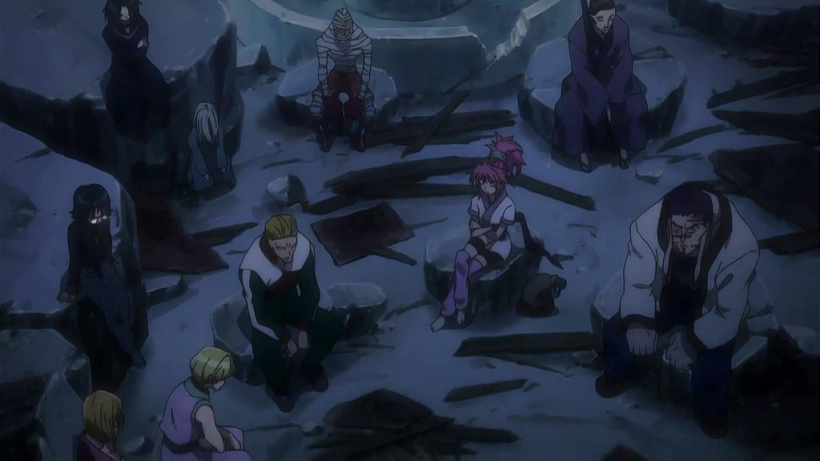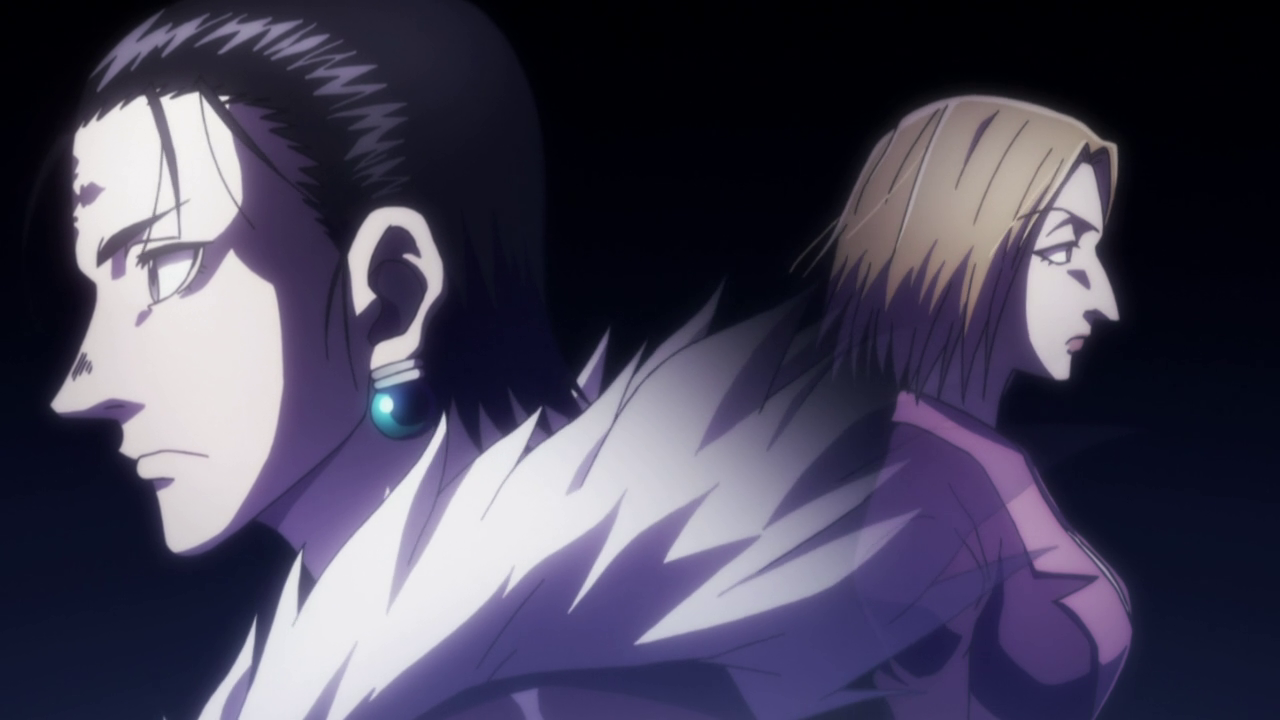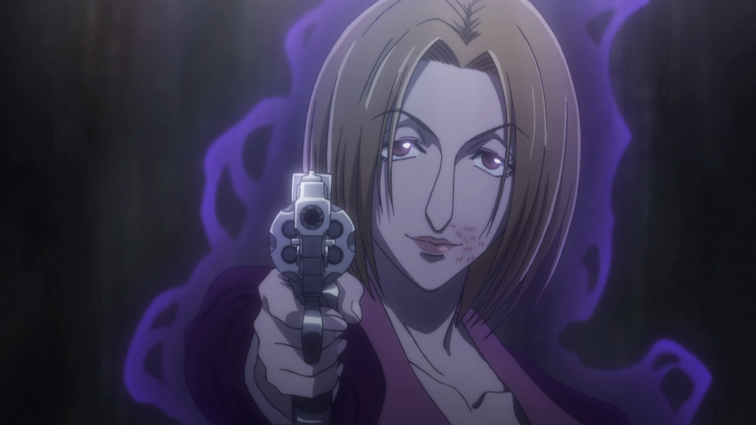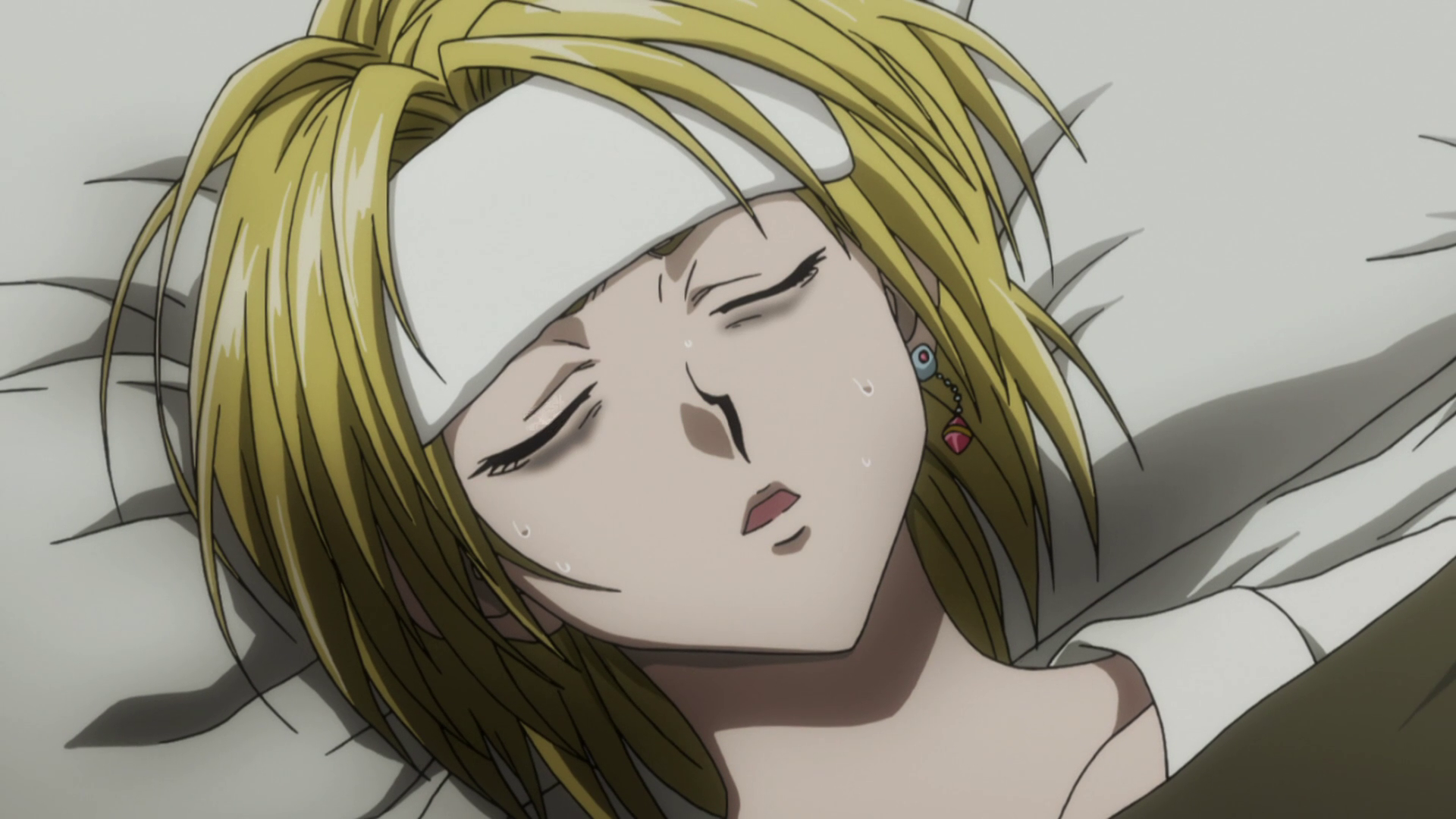12.09

Apparently they're really big Spider-Man fans for some reason
So, what role do the villains have to play in all of this? Villains, as you will find out, is a rather broad and vague term in the world of Hunter X Hunter. In this case, though, the arc chooses to focus on the Phantom Troupe as the primary antagonists. These are the so-called ruthless bastards that have been behind seemingly hundreds of crimes, including the massacre of the Kurata clan and the theft of their scarlet eyes. They are also a group of individuals that grew up in a wasteland together, were never officially recorded by any form of government or establishment as ever having been born, and who basically had to stick together and fend for themselves. So basically they are as much a loving family as they are pretty freaking evil. We got an example of what they are willing to go through with the brutalizing that Uvo endured from Kurapika before finally being off’d for good. The other members of the group show no less devotion to each other when it really comes down to it. In one scene, Nobunaga, Uvo’s closest friend, actually sheds a few tears over the guy when coming to terms with Uvo’s death. This even manages to both surprise and piss off Gon (being held captive at the time) who feels that he has no right to act in such a way after all of the people he’s killed (a shining example of how Gon’s simple-minded nature doesn’t just apply to positive-thinking). Of course, while we do get a feel for each of these characters as individuals, only three of them in particular really get special focus.

They're all just really bummed out that I'm not talking about any of them
We already touched on Uvo, but what about the leader of the group? Rather than waiting multiple arcs to reveal much of anything about the guy, Togashi shows the fans some mercy and lets us understand just what kind of guy he is. Chrollo is, quite simply….the perfect figure to be a leader. He operates on rational thought based on the best interests of his followers, and keeps emotion entirely out of the equation. One surprising instance of this is when the troupe is attempting to find out Kurapika’s identity and whereabouts. While the majority of the group are out for his head, Chrollo expresses interest in enticing Kurapika to join their ranks. This does not mean that he doesn’t give two shits about Uvo. Hell, the guy even composes a requiem for him (in his own really twisted sort of way), and you really get the sense that the guy does truly care for his own. Yet at the same time his rational thinking leads him to believe that someone who was powerful enough to kill Uvo would be much more useful as an ally than as their enemy.

And this is basically Kurapika's response to his generous offer...
Of course, Chrollo’s way of thinking can also be rather problematic, as he doesn’t stop to consider that if someone like Kurapika is out for revenge, there’d be no way they’d bend to his will. He also can be a bit too nonchalant for his own good, going so far as to not even hassle Hisoka (a more recent member of the group), despite clearly knowing that he’s up to no good behind his back. That said, despite any disagreements that they may have with him, the rest of his followers practically worship the guy, not in a hopelessly misguided way, but in a form of respect that any good leader would deserve. After all, he was the one with enough charisma and wit to bring them all together and not only help them to survive, but prosper. He has utmost trust in his followers as his legs, and they have the utmost devotion to him as their head (the analogy is to that of a spider). Unfortunately, that trust and that devotion are the very things that lead to this group’s downfall.
You see, we also have the third member of the troupe, whom in particular gets far more focus than even their distinguished leader. Here, we are talking about Pakunoda. A member who is just as devoted to Chrollo and the rest of the Phantom Troupe as any other member….or perhaps even more so. Yes, there can indeed be such a thing as too much devotion, and Pakunoda really walks a few steps across that line. It is first of all heavily implied that she has romantic feelings toward Chrollo, but of course she is smart enough to know that there is no room for romance within the troupe, so that alone doesn’t get in the way of anything.

And with lady-charming skills like that, who wouldn't FALL for this guy?...I...It's a pun, guys...because she FELL after he knocked her----Oh, just fuck it!
It just so happens that it does in fact cause big trouble after the troupe find themselves in a very intense situation. Toward the climax of the arc, as the Phantom Troupe are hunting down Kurapika (they still do not know his actual identity, at this point), they somehow get the opportunity to capture Gon and Killua (for a second time) during a blunder made by Kurapika. Now they finally seem to have an edge on him.Unfortunately, the protagonists in HXH are smarter than those of most other series, so they retaliate quickly and effectively. When the troupe attempts to use the two kids as bait to draw out the chain user, Kurapika one-ups them by capturing their leader in return. Now each side has bargaining chips. Upon getting the chance to finally meet face-to-face, both Kurapika and Chrollo quickly realize something crucial about each other. For Kurapika, it’s that Chrollo has put no value on his life and cannot be bargained with, so Kurapika will have to focus on holding him hostage and trying to get the Phantom Troupe to give back Gon and Killua unharmed in exchange for him. For Chrollo it’s that he now knows that Kurapika is a guy who places more importance on the safety of his friends than his revenge (I could totally take a stab at Sasuke from Naruto, here, but I’ll play nice for now). Chrollo comes to the conclusion that, as long as the Phantom Troupe does not comply with Kurapika’s bargaining offer, they win.

Chrollo's Inner Thoughts: "Pakunoda, please don't fuck this up."
We even mange to learn the one thing that Chrollo made sure each of his followers knew: that any one of them should be ready to step up as the head and lead the group if he were to fall (or be captured). He had literally made it a point not to place value on his life above their status as a whole, functioning group. That said, Paknoda apparently ripped up the memo, because she’s having none of that. So, despite the protests of the other members, Pakunoda promptly takes Gon and Killua to Kurapika’s designated meeting place. There, she sees Hisoka and realizes that he’s a traitor who had been leaking information to Kurapika about the Troupe all along, but despite her dismay, she can’t do shit to him at this point. Finally meeting with Kurapika, they make the exchange. So, what’s to stop them from attacking Kurapika and killing his friends once the exchange is made? Well, before it actually goes down, Kurapika displays his last hand of cards. He uses his ability to set conditions for both Chrollo and Pakunoda. For Chrollo, it’s that he can’t ever use Nen from this point OR come into contact (physical or otherwise) with ANY of members of his group, otherwise the chain placed around his heart will pierce it and kill him, instantly. For Pakunoda it’s the same cost of life deal, but with the condition that she cannot divulge any information relating to Kurapika’s identity to anyone. Thus, Kurapika is essentially crippling the group by getting rid of its head and simultaneously wiping away any traces leading to him.

"Goddamnit, Pakunoda! You fucked it up!"
Then that means Kurapika wins, right? And was that really all there is to Pakunoda’s character after I said that she got the most characterization out of any villain in this arc? Well, after this whole mess is done and over with, Paknoda’s mental state isn’t exactly stable. For one thing, she realizes how disappointed Chrollo is in knowing that she did the one thing he warned his group to never do, and thusly made them ultimately worse off for it. There is no doubt that she is ashamed of herself, but she still goes through with the deal. Of course, that extreme degree of her devotion does not just end with that. Upon having the boss walk off to an unknown location and leaving Kurapika’s sight, she returns to her group with a determined look. While most of them are ticked off at her abrupt actions which now just got their damn leader sent off, she redeems herself almost instantly by….giving them all of the information that she had gathered relating to Kurapika. And then she dies on the spot. This shocks the rest of the group who, despite finding out Kurapika’s identity at this point, also take the time to lament Paknoda’s death, yet are prepared to not let her sacrifice go in vein.
It was at that moment in which I realized that Togashi had managed to write villains who were every bit as compelling as the protagonists. These guys went through the same kinds of trials and hardships that you’d expect of any grand group of heroes, but they clearly were not of that breed. It was then that another realization hit me, that despite the status of these characters, Togashi had written them as nothing more than characters. Whether they were protagonists or villains only came down to technical story-telling directives. Other than that, the Phantom Troupe were fully fleshed out characters who felt three-dimensional, particularly the main three focused on within this story arc, as they could very well operate on emotions (save for Chrollo), and would downright die for one another just like any of the protagonists would be expected to do.

Gentlemen, this lady has balls. Big, manly balls...
So, how does this arc ultimately conclude?
Well, Kurapika collapses from a high fever shortly after the exchange is made, and he still has a bunch of those scarlet eyes of his clan left to collect, and a bunch of very pissed off Phantom Troupe members still left alive somewhere. Needless to say, he doesn’t exactly have much closure here. What of the Phantom Troupe, themselves? Well, their group is crippled with their leader gone to a location that they are not aware of and two of their members dead. They also can’t go after the chain user right away, since they don’t even know of his current whereabouts. And even freaking Hisoka didn’t get what he wanted! He desired to fight Chrollo himself, only for Kurapika to screw him over too and take away Chrollo’s Nen. So, in the end of this arc, rather than a big epic battle or super thrill-inducing climax, we got a surprisingly subdued game of wits between the two opposing sides. Both sides managed to screw each other over in some way and in return neither got what they wanted and both even had some losses (one group arguably had it way worse than the other, of course). Basically, things boiled down to a bitter grudge match in which nothing was resolved and everyone was left rather unhappy with a sort of depressing tone to the whole scenario. But hey, at least they all still have that FRIENDSHIP stuff….hooray?

Hooray!
The Verdict:
To sum up my thoughts on this arc as a whole, I think its main strengths lie in its execution. The plot itself is great, and that is of course attributed to great writing and great characters. I only really covered Kurapika and the villains because they were the real heart of this story, but there are other intriguing sub-plots and plenty of other fantastic characters and character moments that simply would have taken forever to write about. I think what makes this arc work so well, though, is that Togashi takes what is honestly a very unoriginal and even tired theme for a shounen series and makes it into something that feels fresh and unique. We get that friendship is important, but it’s a story arc like York New City in a series like Hunter X Hunter that actually explores the positive and negative aspects of something that is usually meant to come off as an after-school special message in everything else.
There are some flaws, mind you. You could probably pick out a plot-whole or two if you looked closely enough, and sometimes I did find instances in which we got certain portions of the plot that were largely irrelevant to the rest of the story arc, but these moments were few and brief. I think what stuck out to me the most, however, was just how unapologetic all of it was. It didn’t have a happy ending at all, and throughout the whole thing we saw horrible things happen to both sides. Now, in most instances I find such things to be nothing but cheap shock value, but within this arc I truly felt like Togashi knew what he was doing and at least had a point to the violence at hand. On each subsequent viewing of this story I always felt like there were new layers to the whole thing that I was slowly uncovering, what with all of the action, double-dealings, and hidden sub-text within this character-driven plot. Of course, when everything was said and done, the most important thing about this story arc, which makes it one of my favorites to begin with, is that it was always really damn interesting to sit through.